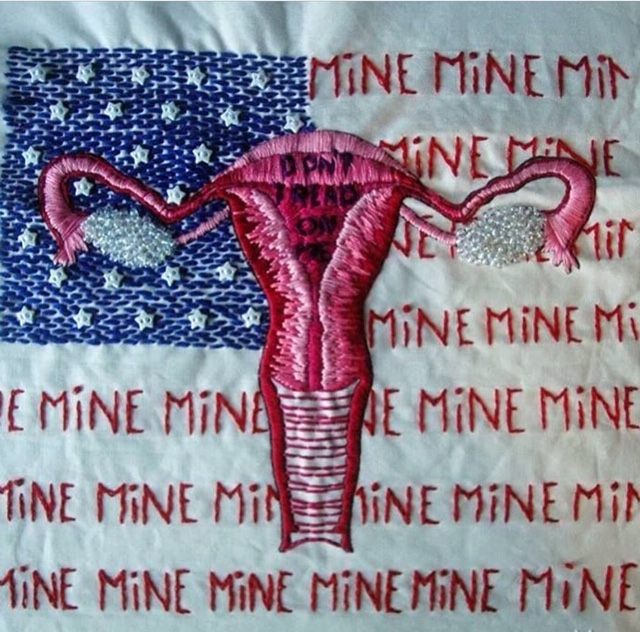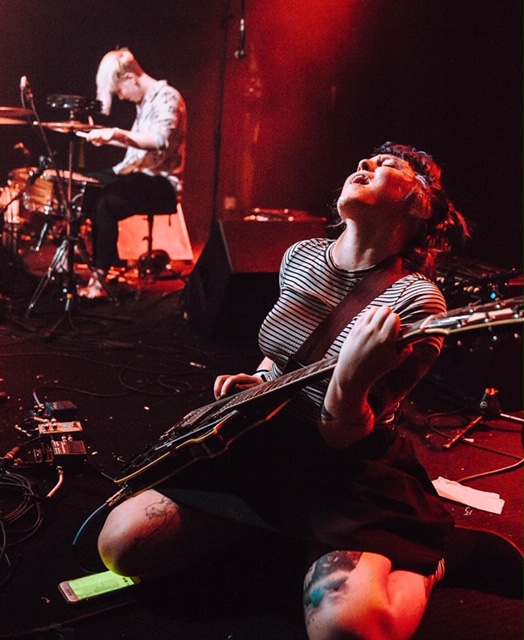The Evolution of Lesbian Punk

Trigger Warning: This article includes topics of rape and sexual assault
The 1990's were the height of lesbian punk. A new genre of lesbian punk began, as the "Riot Grrrl" movement took to stage. Lesbian punk bands began joining the Riot Grrrl movement which soon led to the creation of an entirely new genre. The bands made music that unleashed an unrestrained sound. The girls scream in their songs with violent and empowering lyrics. Their songs have activist undertones, advocating primarily for women, specifically queer women. This subgenre of unrestrained sound and unapologetically queer and feminist lyrics has recently been making a comeback, with lesser-known bands like Grlwood, Childbirth, and Destroy Boys.
In the 90s', the bands that defined this era were Bikini Kill, Babes in Toyland, 7 Year Bitch, L7, Bratmobile, and even Courtney Love’s band, Hole. Some of their lyrics can be seen as rash and controversial to an outsider, such as 7 Year Bitch who has a popular song called “Dead Men Don’t Rape”. However, the aim of this style of the song is to shock and prompt a collective, feminist queer movement to provide a sense of solidarity for all the queer girls who feel lost. All of these bands based their music on the struggles young women face and the desire to break free from social constraints. Finally, a genre for queer girls made by queer girls is taking to the stage to represent the many diverse voices of women.
GRWood is a female punk duo featuring Rae Forester and Karen Ledford from Kentucky. They are a self-proclaimed “scream pop” band (a fabricated genre by the artists). Both artists in GRWood are queer and strive to dedicate their songs to the struggles that women and queer women face in society. Their song “Take Off Your Clothes” on their 2019 album “I Sold My Soul to the Devil When I Was 12”, speaks about rape culture and consent. Their song “Hard to Touch You” talks about what it’s like for a queer woman to be in love with a straight woman. In all of their songs, echoes of the past Riot Grrrl movement are evident. The Riot Grrrl movement casts shadows in GRWoods music as a uniting theme connects the queer community as it did in the 90s.
Image Credit: @willfenwickness on instagram
The band Destroy Boys doesn't always specifically talk about queer issues but are undeniably a feminist punk band, strongly influenced by the Riot Grrrl movement. Destroy Boys are a band from Sacramento, California, with Vi Mayugba (guitar), Ethan Knight (drums), and Alexia Roditis (vocals). Their debut album "Sorry, Mom" is an homage to the female youth. Another song of theirs, “Widow”, has shared the narrative of what it feels like for girls to receive unwanted romantic attention, and being blamed for leading men on solely for being nice.
"Keep it away and leave me alone
I'm not throwing a romantic bone
I used to care but now I don't."
The feminist punk band also created the song "Cattywampus" to address the complicated feelings women have with their bodies.
Image Credit: Elizabeth Pastor, @ elizabethpaigepastor on Instagram - Destroy BoysChildbirth is a band from Seattle, Washington who can be seen performing in maternity gowns. The band makes frequent references to Riot Grrrl issues, such as consent, sex-positivity, queerness, and girlhood, while continuing to maintain a punk tone to all their music. In their song “How Do Girls Even Do It” the band takes a humorous approach to reference the frequently asked intimate question lesbian and queer women are faced with in regards to their sex lives. Another song, “Menopause,” was created to confront female rage. The band has a unique approach in their music, as they take humorous and less serious approaches to very real and relevant female and feminist issues. And yet their songs are just important to the new wave of lesbian punk.
Image Credit: Grif Benzel @grifbenzel on instagram (Childbirth)
These bands are echoes of the past Riot Grrrl revolution and continue to advocate for women, queer or not. Queer songs are rare, and these artists are a great way to explore LGBTQ+ music. Although feminism has grown as a movement since the '90s and women are faced with far less prejudice as society advances, these bands help push society forward and are just as relevant in the current political climate today.










